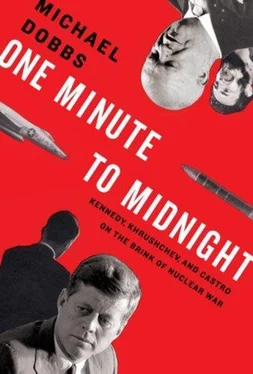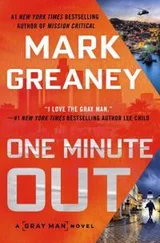“a hostile and militant Communist”: Michael Beschloss, The Crisis Years (New York: HarperCollins, 1991), 101.
“to hurl rockets”: Keating press release, October 10, 1962.
“Ken Keating will probably”: Kai Bird, The Color of Truth (New York: Simon & Schuster, 1998), 226-7. Kenneth P. O’Donnell and David F. Powers, Johnny, We Hardly Knew Ye (Boston: Little, Brown, 1970), 310.
“let it begin now”: William Taubman, Khrushchev: The Man and His Era (New York: W. W. Norton, 2003), 499.
“It reminded me”: Beschloss, 224-7. Robert Dallek, An Unfinished Life (Boston: Little, Brown, 2003), 413-15. Reeves, 174.
“I’m inexperienced”: Reeves, 172.
“fucking liar”: Dallek, 429.
“an immoral gangster”: Beschloss, 11.
the president’s “dissatisfaction”: FRUS, 1961-1963, Vol. XI: Cuban Missile Crisis and Aftermath, Document 19. Sabotage proposals and earlier meeting of Special Group (Augmented) available through JFK Assassination Records Collection, NARA. See also Richard Helms, A Look Over My Shoulder (New York: Random House, 2003), 208-9.
“Demolition of a railroad bridge”: Mongoose memorandum, October 16, 1962, JFKARC.
“the Cuban problem carries”: CIA memorandum, January 19, 1962, JFKARC. See also Church Committee Report, Alleged Assassination Plots Involving Foreign Leaders (U.S. Government Printing Office, 1975), 141.
“Everybody in my family forgives”: Richard D. Mahoney, Sons and Brothers: The Days of Jack and Bobby Kennedy (New York: Arcade, 1999), 87.
“Oh shit, shit, shit”: Dino Brugioni, Eyeball to Eyeball: The Inside Story of the Cuban Missile Crisis (New York: Random House, 1991), 223; RFK, 23.
“the dominant feeling was one”: RFK, 27.
“My idea is”: Reeves, 264; Dallek, 439.
He even had his own full-time: Samuel Halpern interview with CIA history staff, January 15, 1988, JFKARC record no. 104-10324-1003.
“Robert Kennedy’s most conspicuous folly”: Arthur M. Schlesinger, Jr., Robert Kennedy and His Times (Boston: Houghton Mifflin, 1978), 534.
“sit there, chewing gum”: Author’s interview with Thomas Parrott, October 2005.
“reflected the president’s own”: Richard Goodwin, Remembering America (Boston: Little, Brown, 1988), 187.
A top secret Lansdale memorandum: “The Cuba Project,” February 20, 1962, JFKARC record no. 176-10011-10046.
“Lansdale’s projects simply gave”: McManus interview with Church Committee, JFKARC.
“Elimination by Illumination”: Lansdale memo, October 15, 1962, JFKARC; Parrott interview with Church Committee. In a January 1, 1976, letter to the Church Committee, Lansdale indignantly denied making the illumination proposal, but the record shows that he did.
“will meet our requirements”: Robert A. Hurwitch memorandum, September 16, 1962, SCA, JFKARC record no. 179-10003-10046.
“There is only one thing”: Eisenhower presidential papers quoted in Reeves, 103.
“ I know there is a God ”: Ibid., 174.
“odds are even”: Joseph Alsop, “The Legacy of John F. Kennedy,” Saturday Evening Post, November 21, 1964, 17. For the “one-in-five” quote, see Reeves, 179.
“ Bullfight critics ”: Max Frankel, High Noon in the Cold War (New York: Ballantine Books, 2004), 83.
the approval by “higher authority”: Thomas Parrott memorandum, October 17, 1962, SCA, JFKARC record no. 179-10003-10081.
As the winds: State Department history of “The Cuban Crisis 1962,” 72, NSA Cuba; CINCLANT Historical Account of Cuban Crisis, 141, NSA Cuba.
“military intervention by the United States”: JCS memorandum, April 10, 1962, JFKARC.
“We could blow up”: L. L. Lemnitzer memorandum, August 8, 1962, JFKARC. 18 “I am so angry”: Edmund Morris, Theodore Rex (New York: Random House, 2001), 456.
“an importance in the sum”: James G. Blight, Bruce J. Allyn, and David A. Welch, Cuba on the Brink: Castro, the Missile Crisis, and the Soviet Collapse (New York: Pantheon Books, 1993), 323-4.
Bobby Kennedy was already: RFK desk diary, JFKARC. See also Chronology of the Matahambre Mine Sabotage Operation, William Harvey to DCI, November 14, 1962, JFKARC.
“an initial burst”: Evan Thomas, Robert Kennedy: His Life (New York: Simon & Schuster, 2000), 214.
“My brother is not going”: Elie Abel, The Missile Crisis (Philadelphia: J. B. Lippincott, 1966), 51.
According to Harvey’s record: Chronology of the Matahambre Mine Sabotage Operation; Harvey memo on sabotage operation, October 19, 1962, JFKARC.
“I don’t want that man”: Reeves, 182.
America had “the Russian bear”: Brugioni, Eyeball to Eyeball, 469.
As many as 70 million: Reeves, 175.
“These brass hats”: O’Donnell and Powers, 318.
“the military always screws up”: Stern, 38; Beschloss, 530.
Every aspect of the operation had: Author’s interview with Pedro Vera, January 2006; Harvey memo to Lansdale, August 29, 1962, JFKARC; Cuban army interrogation of Vera and Pedro Ortiz, Documentos de los Archivos Cubanos, November 8, 1962, Havana 2002.
“the Farm”: Also known by the code word “ISOLATION” Chronology of the Matahambre Mine Sabotage Operation.
“You do it”: Warren Hinckle and William Turner, Deadly Secrets (New York: Thunder’s Mouth Press, 1992), 149.
“If the Americans see us”: Malakhov reminiscences, Archives of Mezhregional’naya Assotsiatsia Voinov-Internatsionalistov, Moscow (hereafter MAVI).
the 79th missile regiment: V. I. Yesin et al., Strategicheskaya Operatsiya Anadyr’: Kak Eto Bylo (Moscow: MOOVVIK, 2004), 381. Except where noted, all references to this book are to the 2004 edition. Some of the names of the missile regiments were changed for Operation Anadyr as part of the Soviet disinformation campaign. The 79th missile regiment was also referred to as the 514th missile regiment in Cuba. The CIA incorrectly reported that a missile site near San Cristobal was the first to achieve combat-ready status.
given a special “government assignment”: Sidorov’s account of the deployment is contained in A. I. Gribkov et al., U Kraya Yadernoi Bezdni (Moscow: Gregory-Page, 1998), 213-23.
All this was part of a much larger: Col. Gen. Sergei Ivanov memo, June 20, 1962, Soviet defense minister Rodion Malinovsky memos, September 6 and 8, 1962, trans. in CWIHP, 11 (Winter 1998), 257-60.
“The motherland will not forget”: Malakhov, MAVI.
The first ship to depart: For shipping tonnages and descriptions, I have relied on Ambrose Greenway, Soviet Merchant Ships (Emsworth, UK: Kenneth Mason, 1985). I use gross tonnage, a measurement of volume, not weight.
In all, 264 men had to share: Author’s interview with Lt. Col. Sergei Karlov, official historian, Peter the Great Military Academy of Strategic Rocket Forces (RSVN), May 2006.
Military statisticians later estimated: Ibid.
“barreled gas oil”: NSA Cuban missile crisis release, October 1998.
McNamara estimated Soviet troop: JFK2, 606. The CIA had estimated 3,000 Soviet “technicians” in Cuba on September 4. By November 19, they increased the estimate to 12,000-16,000. In January 1963, they concluded retrospectively that there were 22,000 Soviet troops in Cuba at the peak of the crisis. See Raymond L. Garthoff, Reflections on the Cuban Missile Crisis, 2nd ed. (Washington, DC: Brookings Institution, 1989), 35.
“For the sake of the revolution”: Author’s interview with Capt. Oleg Dobrochinsky, Moscow, July 2004.
citing a “traffic accident”: Final report by Maj. Gen. I. D. Statsenko on Operation Anadyr (hereafter Statsenko report);see Yesin et al., Strategicheskaya Operatsiya Anadyr’, 345-53.
Читать дальше












